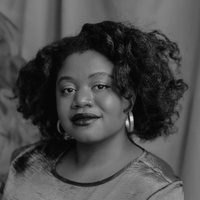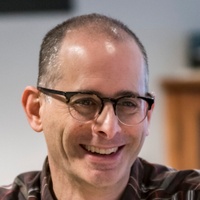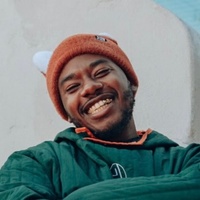As told to Loré Yessuff, 1755 words.
Tags: Writing, Art, Process, Success, Failure, Creative anxiety, Money.
On navigating different kinds of creative relationships
Writer, artist, and educator Tatiana Johnson-Boria discusses imposter syndrome, finding genuine community, and on what you learn from being an educator.What was the starting point for you as a writer? At what point did you decide, “Oh, this is kind of what I want to dedicate my life to”?
It’s a bit of a winding road. In high school, I started learning about poetry in general, learning that Black people could write poems and that there were poems by Black people in the world. Our teacher had us do this assignment through Poetry Out Loud. We had to choose a poem, and I found one by Nikki Giovanni. We had to recite it, and it felt so freeing to read her poem aloud, and I just kind of fell in love with it then.
After that, I wrote stuff and I never really thought I could be a poet or a writer for a very long time. I went to film school. And throughout film school, I was just writing poems the whole time. And I remember my advisor was like, “Well, did you think about getting an MFA in creative writing?” And I realized maybe I was in the wrong program.
Then I got my MFA and worked at the same time, so I wouldn’t have to take out loans, which was very difficult. But I think it was honestly then when I started thinking, “Okay, maybe I am a writer.” I still feel like that. Some days, I’m like, “Am I a writer?”
That’s so funny because you literally have written books! Of course, you are! But I get it. A lot of writers still question if they’re really writers.
I was just thinking about this the other day. When you’re an artist, you’re kind of outside of the conventions of making money, so it feels like what you do isn’t being affirmed. And you’re constantly trying to affirm it for yourself, but it’s a strange relationship. So I think that might be why I still feel this way because I don’t get to do this all the time. And it’s not making me the money I need to sustain my life.
It’s a common conundrum, this question of, “At what point in my life will I feel like I’m an artist?” Do I need to publish one book, two books? Do I need to be making this much money or that much money? I think it’s hard and you said it so well. You’re also an educator and a coach. How has teaching and coaching helped you view your own writing practice with more clarity?
One of the things I always say when I’m working with writers is that you are a writer, the only difference between you and someone published is just being published. We’re all practicing in that art form. And so that’s something I try to instill in people. Especially because we don’t often hold our work in the same regard as maybe someone who’s published a book that we look up to. The real difference is the publication and all the other stuff that comes along with that. I try to help people look at their own work with that same reverence and I’m always like, “Oh, yeah, I have to do that, too.” It’s an ongoing decision or choice you have to make about yourself. [Teaching and coaching] are reminding me of that. They’re teaching me the vision I have is worthy of time and investment.
So many of us spend all day online just comparing ourselves to what other people are doing, it makes sense that people are reaching out to you for guidance.
It’s understated how much community matters for writers, and the right community, too. In publishing, there’s obviously a lot of gatekeeping, it’s very easy to feel excluded. So, of course you’re going to be like, “Does this make sense? What am I doing?” Having a community that cultivates and uplifts you is a way to combat that.
I totally agree. How do you go about protecting your creative side from the demands and pressures of the publishing world?
That’s something I’m still learning. It’s been especially hard because I’m working on a long-form nonfiction project. And this is a project that I have with an agent, which is different. She showed it to publishing people and there was a lot of positive feedback, but then there was a lot of stuff that I was like, wow, people say some [crazy] stuff about people’s work. I was trying not to take it personally, but how do you not internalize that? And how do you feel motivated to continue with your project? So I’ve been trying to find some rituals for myself. For example, I’m really into tarot so anytime I’m about to start writing on this particular project, I pull a tarot card and it usually affirms what I’m doing. These very tangible rituals have helped protect me. Also reading stuff that I felt like I desperately needed makes me feel like, okay, maybe this book can exist in the world.
There’s this essay by Kiese Laymon, who wrote the book Heavy. In [the essay], he talks about his experience working with publishers on that. And it seems really bad what happened, all these years he worked on it and didn’t have a good relationship with the editor. It was just a mess. I think he had to republish it. When I read it, I was like, “Wow, if he had this experience with the publisher, what is it going to be like for me?” But also that’s not something I would’ve ever known unless I read that essay. It’s just very unclear what that world is like. It can be really damaging to your self-esteem.
Like you’re saying, it’s an ongoing process. I recently read this book called My Trade Is a Mystery by Carl Phillips. It’s a collection of seven essays, each one related to a different element of the writing life. I think it’s ambition, stamina, practice, audience, politics, silence, and community. Either in the ambition or stamina chapter, Phillips talks about how, often, we look to publishers and the market for some sort of sign that we are good enough. But like what you’re saying, it gives us the opposite effect, it makes us feel worse. He says to just focus on the work. The work and community. Those are the only things that ultimately can keep us going because those are the things that have the most depth and the most life. Also, he’s a Black, queer man and he also talks about how community based only on identity can sometimes feel empty, which was really interesting.
That feels very true! Even in some communities where it’s like, for example, “this is for Black poets,” even that can sometimes feel like, I don’t have a space there, or I don’t know the right people. It’s hard.
There’s this idea, in the online world at least, that when you find your people you’ll just immediately feel right at home and you’ll feel so reified and so affirmed. But that hasn’t really been my experience. I do meet amazing people here and there but I don’t know, community can feel so amorphous. What has your experience been like?
I feel like that is really spot on. I have definitely experienced what you’re saying. I remember taking a workshop with this writer, a Black writer, but I just didn’t feel held in that space. It has surprised me, the spaces where I have felt held even when maybe the people do not even have the same identity as me. It’s something I’ve talked to a couple of my friends about, trying to understand. But there are different types of relationships too. I feel like some of them are transactional kinds of relationships, and some of them are actually friendships. You don’t want to enter a space in which you’re forcing either thing, but you also want to feel good.
Exactly.
Publishing sometimes does rely on relationships and who you know so that complicates things.
It can feel very…sore. I think that’s why Carl Phillips’s book really spoke to me. Even when he speaks about trying to find community, he brings up something that I found to be really meaningful. He says, “We tend to think of a writing community as a community of writers, but I find I still prefer the community not [of] writers, but what they’ve written.” And I was like, woah!
That’s a little mind-blowing.
Despite how hard it is to build community, why does it still feel like a worthwhile thing for you to pursue?
I’m going to share an example first. I have a friend who happens to be a poet and writer. We became friends first before I knew she was a writer. We were doing an event about Phyllis Wheatley, and we were celebrating these letters that were uncovered between Phyllis Wheatley and Obour Tanner, who were both enslaved Black women in New England, and how they were just connecting to each other via these letters, affirming each other’s existence. And I remember she said something like, “This is our friendship. We’re sharing these letters, and sometimes you may not hear from me or I may not hear from you. But we have this line that connects us in this way that we see each other and we are looking out for each other.”
And that’s what I think community means to me, a real care and almost a protection of another person, and wanting to see what’s best for them, wanting them to shine. I think that requires some real fundamental trust with another person, that comes with just building a relationship. But I think the people that I’m in community with, oftentimes I feel like I became their friends before writing was even involved. Or the other times, when there’s writing involved, I feel like they’ve just been open and receptive to connecting just to connect. And when I can sense that somebody really cares about me, not to get something out of our relationship, but just genuinely cares, as a human being, that’s always worthwhile.




